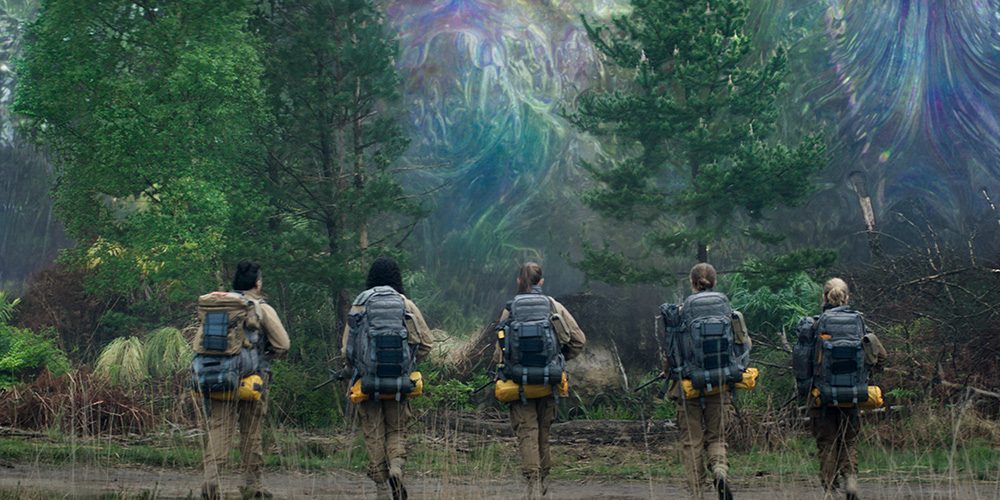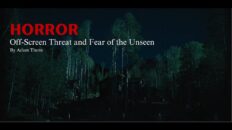“[L]et Ahab beware of Ahab; beware of thyself, old man.” ― Herman Melville, Moby-Dick
***
Writer turned director Alex Garland trades in pulp genres–science fiction (Sunshine, Ex Machina), horror (28 Days Later), magical realism (The Beach)–but what he writes is aimed directly at the human condition: who we are, who we could be, and why we often sabotage ourselves. It’s heady stuff. Stuff we don’t often like to look directly at and confront ourselves and those around us with.
Annihilation is loosely adapted from an award-winning science fiction novel of the same name by author Jeff VanderMeer and tells the story of Lena (Natalie Portman), a cellular biologist whose husband (Oscar Isaac) mysteriously reappears at their home after a year on a top-secret mission. She winds up joining a team–a new expedition–into the quarantined area her husband had gone after he falls terminally ill. The area is called the “Shimmer”–a growing patch of land, expanding since a meteor struck a lighthouse in a national park. Every team–mostly military–sent in to the Shimmer has disappeared, the only person returning, inexplicably, has been Lena’s husband, and she joins the expedition to find out what happened to him.
Lena is joined by a group of four other women, all scientists, including psychologist Ventress (a stoic Jennifer Jason Leigh) who has profiled everyone who has thus far entered the Shimmer, Thorensen (Gina Rodriguez), Sheppard (Tuva Novotny), and Radek (Tessa Thompson). And all have reasons for joining an expedition that can only be expected to be a one-way trip. And this, more than any mutant or alien threat or explanation is what the film is wrestling with.
It’s natural for viewers to want clear resolution. An answer to why the crocodile–or is it an alligator?–has teeth like a shark. Or why and how a beautiful, grotesque plant–or is it something else?–has grown out of a man’s midsection after he was cut open by his friends. Or why a mutant bear screams like a woman. Or why time seems to disappear upon entry into the Shimmer. Or why trees grow in the shape of humans. Or why… Well, you get the idea.
The film actually provides an answer for all these questions in a blink-and-you’ll-miss-it explanation by Tessa Thompson’s Radek character. It involves an understanding of how prisms work, a basic knowledge of cellular biology, a truly alien arrangement of what we perceive the building blocks of life to be, and a bit of fiction. But you don’t need to fully comprehend the hows and whys of what happens to lifeforms in the Shimmer to be able to recognize and grapple with the themes the film is exploring.
Brokenness, desire, hope, fear, longing, and the desire to be reborn and renewed. At one point, in a flashback, we see Lena discuss the properties of God with her husband in a bit of philosophical pillow talk. God doesn’t make mistakes–that’s inherent in the definition of God, he posits. We age because of a flaw in the division of our cells, they don’t reproduce perfectly as they theoretically should, she argues, He made a mistake in the machine he created. And a later conversation with Ventress draws the comparison between the physical, biological trend toward self-destruction and human’s mental and psychological inclination for the same. This, notably, is not the same as suicide. It is just… natural. The way of the world. The way of things.
Something Garland, as a writer, seems to be plagued by is giving broad, easily recognized strokes to his supporting characters. He managed to sidestep that issue in his last film, and directorial debut, Ex Machina, by essentially not having any. But here that weakness is on full display. On the other hand, despite the broad characterization, each of the actresses brings their A-game to their characters and we still get a sense of who they are generally, and how they are broken individuals. A dissolving marriage, a terminal cancer diagnosis, addiction, the loss of a loved one, and the sense of not being alive without physical pain.
All of these issues have broken otherwise intelligent, competent, able-bodied individuals (some may note, all women) and given them motivation to venture into the unknown, an alien mutated area on the coast of somewhere-USA, yes. But metaphorically, this happens to us in real life every day when we reach a point where our comfort zones have fallen apart and our privilege no longer shelters us from that mistake God made. And when that happens, what happens next–in the unknown–changes us and the world around us.
And here the film turns allegorical. Some of us are consumed by our fear, and that fear becomes a part of what consumed us. Some of us are overcome by the demons that originally broke us and we can’t outrun. Some give up the fight and fade (peacefully?) away. Some of us fight on until we can face the unknown at our end. And some come through the experience to return, reborn, renewed. But above all, utterly changed.
Annihilation will frustrate and infuriate some audiences. After my screening, a viewer commented, “Well, I won’t be recommending this movie to anyone.” But it will engage others. It traffics in the grotesque, takes its time to wrestle with the physical and spiritual demons of self-destruction that plague us all–whether we admit to them or not–and challenges conventional film norms on multiple levels. So for better or worse, no matter how it may change you, unlike my fellow viewer, I am happy recommending it to everyone.








